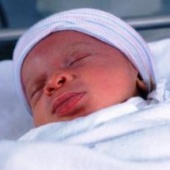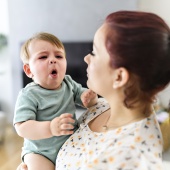Infections can cause a high temperature or fever in children. We discuss the signs and symptoms of fever, the causes and when to seek medical advice.
If a baby or child has a high temperature or fever it can be worrying. It can help to remember that a high temperature is the body’s way of fighting infections like coughs or colds (NHS, 2024a).
Parents or regular caregivers who know a baby well should trust their instincts. Sometimes a temperature can be a sign of something more serious, like sepsis (a life-threatening reaction to infection).
If it feels like something isn’t right or there is cause for concern, especially with a young baby, urgently contact the GP or call NHS 111.
What is a high temperature or fever?
Every baby’s normal temperature is different (NHS, 2024a). It can be useful to know what their resting temperature is when they are well to compare with when they seem poorly.
A temperature of 38°C (100.4°F) or above is considered high in children. It is common and usually returns to normal in under four days (NHS, 2024a).
If a baby under three months old has a temperature of 38°C or over, or a baby between three and six months old has a temperature of 39°C (102.2°F) or more, call your GP or 111 urgently (NHS, 2024a).
How to tell if a baby is unwell
Signs in a baby may include (NHS, 2024a):
- looking or feeling unwell
- being hotter than usual to the touch on their forehead, back or tummy
- feeling sweaty
If you think your child has a fever, the most accurate way to check is to use a digital thermometer in the armpit.
When do they need medical help?
Get an appointment with the GP or call NHS 111 if (NHS, 2024a):
- a baby under three months old has a temperature of 38°C or over
- a baby over three months has a temperature of 39°C or over
- the fever lasts more than five days
- they have other signs of illness, such as a rash, as well as a high temperature
- they don’t seem themselves
- they do not want to eat or drink
- they seem dehydrated, their nappies are dry, or their eyes appear sunken
- you're concerned
Call 999 or go to the Emergency department if a baby (NHS, 2024a):
- has a rash that won’t fade when a glass is rolled over it
- has a stiff neck
- has unusually cold hands or feet
- has skin or a tongue that appears blue, grey or paler than normal (on Brown or Black skin, this can be easier to see on the palms of the hands or soles of the feet)
- isn’t responding as usual or is hard to wake
- is crying constantly or appears confused
- is having difficulty breathing, is making grunting noises or their stomach is sucking into their ribcage
- has a febrile seizure for the first time
Our NCT Antenatal courses offer exclusive access to Mini First Aid newborn safety and baby health videos. These describe signs to look out for.
How to take a baby’s temperature (NHS, 2024a; NICE, 2019)
- For children under five years old, it’s best to take their temperature under their armpit. This method is better than using the ear, forehead, mouth or rectally (in their bottom).
- Place the thermometer under their armpit.
- Gently hold their arm in to the side of the body until the reading is ready. The instruction leaflet will say how long this will take.
- The thermometer might beep when it has taken the temperature.
- Remove the thermometer to see the reading.
- Make a note in case you need it later. You could take a photo of the thermometer showing the reading.
What to do if a baby has a high temperature
Mild fevers can be treated at home. This can be done by (NHS, 2024a):
- carrying on offering them small frequent drinks of breastmilk or formula. Babies on formula or solid food might want extra sips of water if they seem dehydrated
- giving them food if they want it
- keeping them within sight
- giving them medicine if they are uncomfortable
Don’t (NHS, 2024a):
- cover them in too many blankets or clothes
- sponge them down with cool water – the high temperature is a healthy response to infection
Read more about caring for a sick baby at home in our article on coughs and colds.
What medicines can babies have?
Babies over two months old can have infant paracetamol, and over three months old they can have infant ibuprofen. These are available in pharmacies or supermarkets, and can help if the baby seems distressed (NHS, 2024b).
Check with a pharmacist or GP if (NHS, 2024b):
- The baby is less than 5kg – they should not have ibuprofen
- The baby has asthma – they might not be able to have ibuprofen
Aspirin is not suitable for a baby or child under 16 years old. This also means not using it while breastfeeding (NHS, 2024b). Aspirin can be associated with a rare condition called Reye’s syndrome.
A pharmacist may be able to prescribe medication. Prescribed medicines for children under the age of 16 are free of charge (NHS, 2024b).
Antibiotics
Viruses cause many of the illnesses that babies pick up. Antibiotics won’t treat viruses like a cold, so they won’t be prescribed.
If your baby is given antibiotics for a bacterial infection, it is important to finish the course, even if they seem better after a couple of days. This makes sure all the bacteria are killed off. It also reduces the risk of the bacteria becoming resistant to antibiotics (NHS, 2024b).
What is a febrile seizure?
Febrile seizures are sometimes called febrile convulsions or fits. A high temperature in babies can cause them. Children between six months and six years are most affected by febrile seizures (NHS, 2023).
If a child is having a febrile seizure, they may become stiff, twitch or lose consciousness. This can be very scary but it’s unlikely to cause long-term harm (NHS, 2023).
Febrile seizures can last around two to three minutes, and aren’t usually longer than 10 minutes. After the seizure, the child might seem sleepy or confused for up to an hour (NHS, 2023).
It might help to record a video of the baby while they’re having a seizure to show to healthcare professionals.
Take a baby or child to the Emergency department or call 999 if they (NHS, 2023):
- had a seizure and they haven’t had one before
- are having trouble breathing
- had a seizure which lasted for more than five minutes
- have twitching or stiffness, only on one side of their body
- have had more than one seizure in 24 hours
Ask someone else to drive so you can care for the baby (NHS, 2023).
If the baby is unconscious or still having a seizure, call 999 (NHS, 2023). Go to the NHS page for more information on febrile seizures.
Signs of dehydration in a baby
Fever can cause dehydration, and babies and children are more at risk than adults (NHS, 2022). Read our article on signs of dehydration in children.
NHS (2022) Dehydration. https://www.nhs.uk/conditions/dehydration/ [29 Nov 24]
NHS (2023) Febrile seizures. https://www.nhs.uk/conditions/febrile-seizures/ [29 Nov 24]
NHS (2024a) High temperature (fever) in children. https://www.nhs.uk/conditions/fever-in-children/ [29 Nov 24]
NHS (2024b) Medicines for babies and children. https://www.nhs.uk/conditions/baby/health/medicines-for-babies-and-chil… [29 Nov 24]
NICE (2019) Fever in under 5s: assessment and initial management [NG143] https://www.nice.org.uk/guidance/ng143 [29 Nov 24]







